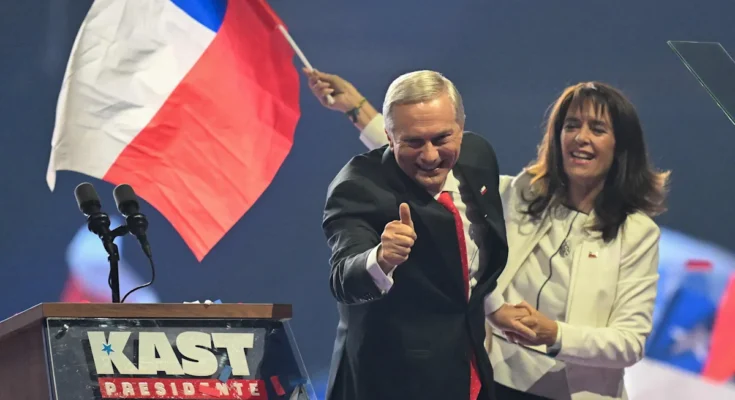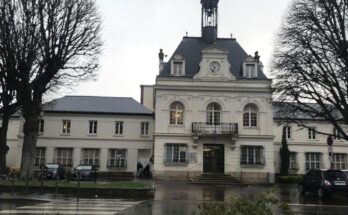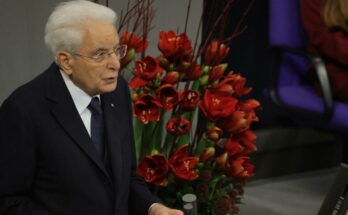The son of a German Wehrmacht officer wants to become president of Chile. The odds are good for José Antonio Kast, who is Catholic. He has rallied support from Trump-aligned “Republicans” – and the country is yearning for an ultra-conservative hardliner.
All good things come suddenly, shouted José Antonio Kast (59) to around 10,000 enthusiastic supporters at the Movistar Arena in Santiago de Chile. While Chileans usually enjoy loud rock concerts, hard-line right-wing groups have seized power. The atmosphere in the large hall was like that of a Republican Party conference in America.
And that’s what he wants: Kast has built his Chilean “Republicanos” bit by bit over the past ten years based on Trump’s model. “The power of change” is written on thousands of flags in Chile’s three national colors: white, blue and red. This was the third attempt by the son of a German Wehrmacht officer who emigrated to Chile and perhaps the most promising.
Because Kast is an alternative personification of the hapless socialist President Gabriel Boric (39), who cannot be re-elected due to term limits. Support ratings for the former student leader, who was elevated to office by a wave of left-wing social protests in 2022 at the age of 36, are already dire.
For Boric, the position came several years too early. Now, given the rise in daily crime, the majority of Chileans seem to yearn for a right-wing hardliner with gray hair and the demeanor of a law-enforcing sheriff who will restore order to the city. Kast is a devout Catholic, father of nine children, and very conservative.
This week is the first round of the long-awaited presidential election in Chile. After a historic turnaround in Bolivia, where Rodrigo Paz of the Christian Democratic Party broke socialist dominance for the first time in 20 years a few weeks ago, there are also signs of a radical policy shift in Chile. Polls predict that one of the three right-wing candidates will emerge as president no later than the December 14 runoff election that will almost certainly be necessary.
After Javier Milei’s libertarian movement was strengthened in the parliamentary elections in Argentina, the entire lithium triangle of Argentina, Bolivia and Chile will likely be determined by a libertarian-conservative government in the new year. The days of left-wing dominance over one of the most important raw materials of the future, primarily batteries needed for the e-mobility transport transition, are coming to an end.
This opens up completely new perspectives, especially for the United States: “The impressive and widespread positive attitude towards the United States in the region, which is perhaps even greater than in Trump’s first term, opens up important strategic opportunities for Washington in regional multilateral organizations as well as in economic, security and other areas,” said Dr. Evan Ellis, research professor of Latin American studies at the US Army War College, in conversation with WELT.
Four names stand out among the candidates who have hopes of becoming Boric’s successor: communist Jeanette Jara, 51, is running for the left-wing government and leads the polls with around 30 percent. However, he will likely lose the runoff election against all three right-wing challengers.
Kast is considered the most promising candidate of the right-wing “Republicanos.” Christian Democrat Evelyn Mathei (72) represents the moderate center-right camp. Johannes Kaiser (49), a libertarian, who promises strict migration and deportation policies, is very active on social media. He was expected to be a surprising success.
No sound for uncle
“We will see that the three opposition candidates opposing Boric’s government will receive significantly more votes than the left wing. The Chilean population rejects the ideas of the left extremists,” said Chilean Senator Felipe Kast. He accused the Jara communists of wanting to continue Boric’s policies. WELT contacted José Antonio Kast’s nephew in his car on his way to an election campaign event.
He himself fought for votes for the liberal movement “Evopoli”. However, among the other candidates, it was not his uncle who supported Evelyn Matthei: “He best represented the liberal values that allowed him to beat the communist candidate comfortably in the second round.” Regardless of who wins the election, “Chile will fulfill all its international obligations,” Felipe Kast said. All three opposition candidates will respect the institutional framework.
The left-wing government accused candidates Mathei, Kast and Kaiser of trivializing the period of right-wing extremist dictatorship (1973 to 1990). Under General Augusto Pinochet, around 2,000 people were murdered and tens of thousands were tortured with the help of the American secret service CIA. 1,000 people missing. José’s older brother Antonio Kast was a priest under Pinochet during this dark time.
The libertarian candidate Kaiser argued that Pinochet prevented Chile from becoming a left-wing dictatorship like Venezuela or Cuba. However, Pinochet was also a dictator responsible for serious human rights violations.
Communist Jeanette Jara had to listen to the same accusations from the right wing. In recent years, despite reports of torture and serious human rights violations in Cuba, he has argued that Cuba’s one-party regime is “a different kind of democracy.” It was only during the election campaign that he began to distance himself from his previous pro-dictatorship statements.
Tobias Buyer is Latin America correspondent. He has reported on developments in the region on behalf of WELT since 2009.



